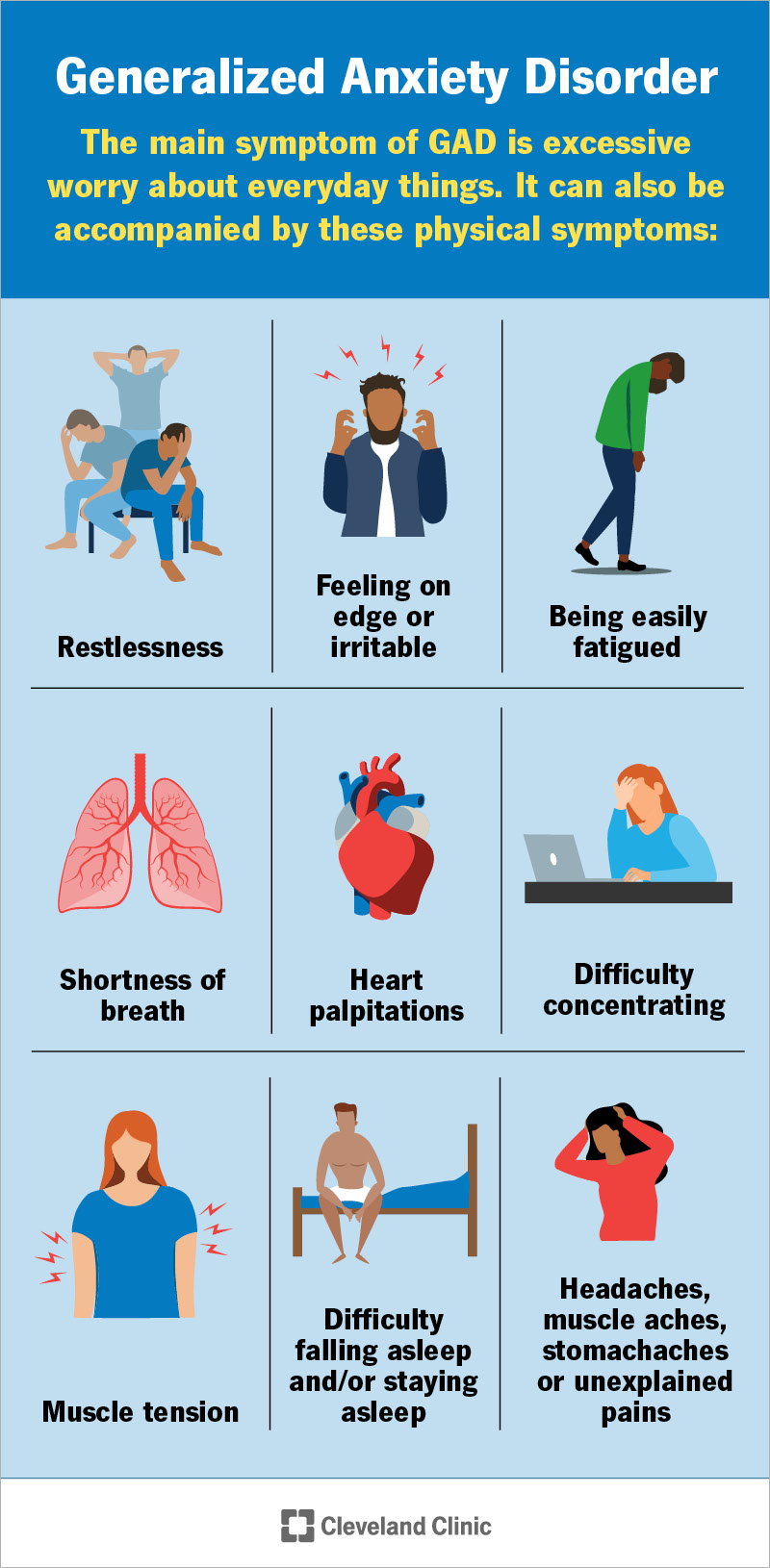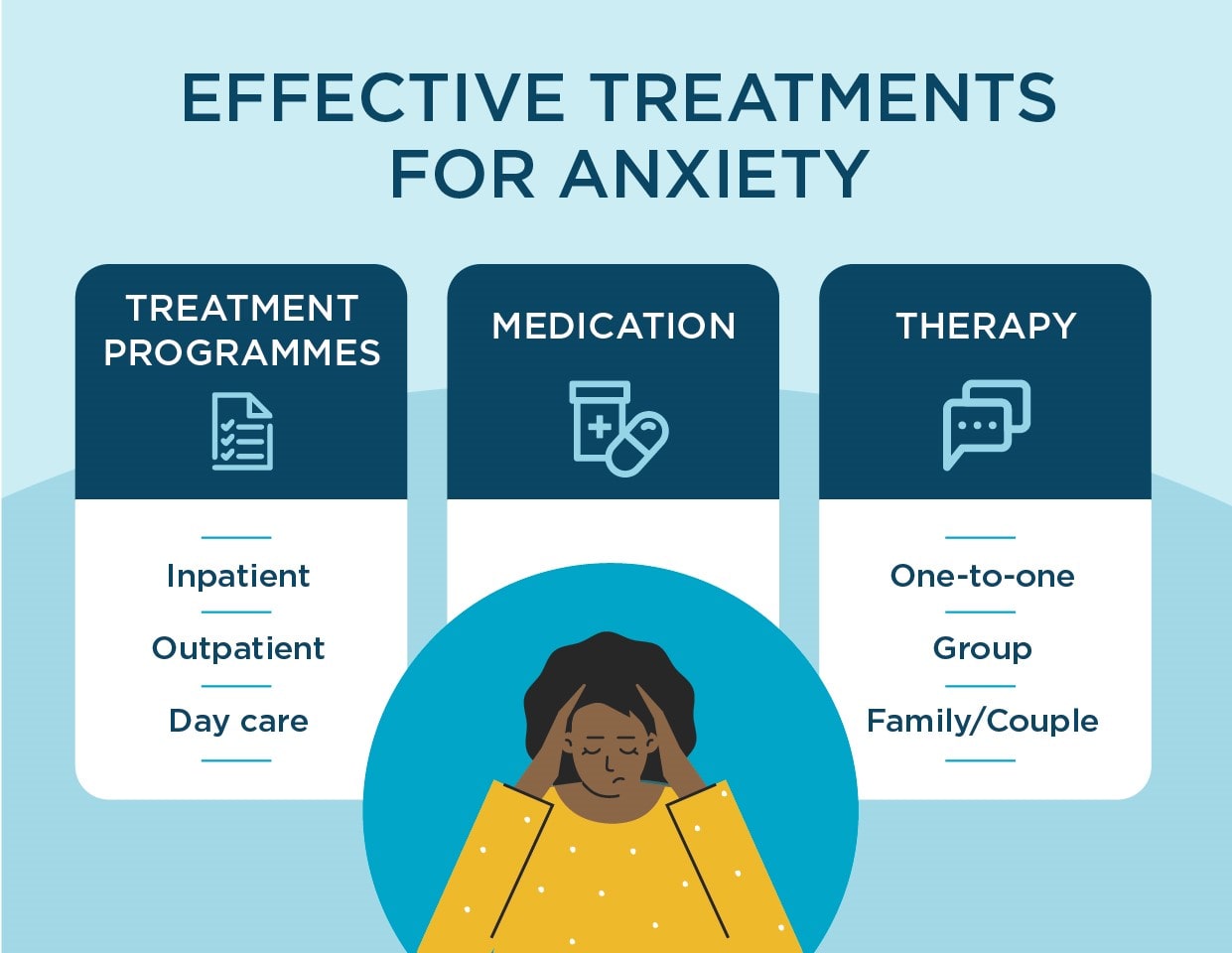Reclaim your emotional health through therapeutic therapy for anxiety
Reclaim your emotional health through therapeutic therapy for anxiety
Blog Article
Exploring Various Strategies in Coaching for Stress And Anxiety Condition for Long-term Modification
When dealing with anxiety conditions, it's necessary to discover a selection of therapy techniques. Each technique supplies special insights and tools to aid you manage your signs and symptoms effectively. You may locate that integrating techniques can produce the most effective results. However, recognizing the subtleties of these methods is vital to fostering long-term adjustment. What happens if the best mix could launch a new degree of psychological health for you?
Understanding Anxiety Conditions: A Short Introduction
Anxiety disorders, which impact millions of individuals worldwide, can greatly influence everyday life. You might experience overwhelming feelings of fear or worry that seem uncontrollable. These feelings can lead to physical symptoms like a racing heart, sweating, or even dizziness. Usual types of stress and anxiety problems consist of generalised stress and anxiety problem, panic disorder, and social anxiousness disorder. Each has distinct indications, but they all share a propensity to interrupt your routine and relationships.Understanding the root causes of your anxiousness is important. It could come from genes, mind chemistry, or life experiences. Recognizing your triggers can help you handle your actions much better. It is essential to keep in mind that you're not the only one in this struggle. Many individuals deal with similar difficulties, and seeking assistance is a solid action toward sensation better. By learning more about anxiety disorders, you're currently on the path to understanding and managing your problem better.
Cognitive-Behavioral Therapy: Testing Adverse Thought Patterns

Determining Negative Idea Triggers
When you experience moments of distress, identifying the particular triggers behind your unfavorable ideas can be necessary in managing anxiety. Start by taking note of situations that prompt sensations of fear or fear. Is it a congested space, a forthcoming due date, or a conversation with certain people? Write down these instances in a journal. This will aid you identify patterns in your thinking. Likewise, notice physical feelings that accompany your unfavorable thoughts, like an auto racing heart or rigidity in your upper body. By determining these triggers, you obtain understanding into what's fueling your anxiousness. Recognizing these links is the initial step in testing those thoughts and eventually gaining back control over your psychological feedbacks.

Changing Thoughts With Positives
Testing negative idea patterns is a vital action in transforming your attitude and reducing anxiety. You may commonly find on your own caught in cycles of insecurity or tragic reasoning. As opposed to letting these thoughts dictate your sensations, technique replacing them with favorable affirmations or sensible choices. When you think, "I can't manage this," change it to, "I can take care of challenges one action at a time." This straightforward modification can substantially influence your mood. On a regular basis recognizing and responding to these adverse thoughts assists create a much healthier inner discussion. Keep in mind, it takes time and initiative, however regularly exercising this strategy can bring about lasting modification, encouraging you to face anxiousness with restored confidence and resilience
Structure Coping Approaches Together
Changing negative thoughts is only the beginning of taking care of stress and anxiety successfully. To develop long-term adjustment, you require to build coping strategies that equip you. Cognitive-Behavioral Therapy (CBT) assists you recognize and challenge those unhelpful thought patterns. Together, you and your counselor can explore how these thoughts effect your feelings and behaviors.Start by developing sensible methods, like journaling or mindfulness workouts, that permit you to confront anxiety head-on. When you face your fears slowly, you'll discover to react in different ways.

Mindfulness and Acceptance-Based Approaches: Cultivating Present-Moment Understanding
As you navigate the complexities of anxiousness, incorporating mindfulness and acceptance-based methods can substantially enhance your capacity to cultivate present-moment recognition. By focusing on the right here and now, you'll locate that you can observe your thoughts and sensations without judgment. This method helps you recognize your anxiety without really feeling overwhelmed by it.Engaging in mindfulness workouts, such as deep breathing, body scans, or directed meditations, permits you to ground yourself in your existing experience. Acceptance-based strategies motivate you to welcome your emotions instead than battle against them. When you approve your sensations, they lose their power over you.Incorporating these practices into your daily regimen can transform how you reply to stress and anxiety. You'll develop resilience and discover to browse stressful situations with higher convenience. Ultimately, cultivating present-moment recognition lays the foundation for enduring adjustment, encouraging you to lead a much more fulfilling life.
Exposure Therapy: Facing Concerns Progressively
Direct exposure treatment assists you face your anxieties in a gradual means, making it much less frustrating. You'll find out methods to deal with anxiety-provoking circumstances detailed, while additionally constructing coping techniques to handle your responses. This strategy equips you to take control and minimize stress and anxiety with time.
Gradual Exposure Methods
When facing anxiousness, progressively challenging your anxieties can be a powerful means to reclaim control. This technique, referred to as gradual exposure, entails gradually exposing yourself to the situations or objects that activate your anxiousness. Start with less daunting scenarios and progressively work your means up to more tough ones. If you're terrified of public talking, you could begin by talking in front of a mirror, then proceed to sharing thoughts with a pal, and ultimately deal with a tiny team. Each step helps desensitize you to the fear, developing your self-confidence over time. Keep in mind, it's important to rate on your own and celebrate small victories as you move through this process, enhancing your capacity to handle stress and anxiety properly.
Building Coping Methods
Structure effective coping strategies is necessary for managing stress and anxiety, especially as you challenge your fears slowly. One effective method is direct exposure treatment, where you begin by encountering your worries in a regulated manner. Begin with much less daunting circumstances and slowly function your means up to even more challenging circumstances. This progressive direct exposure helps desensitize you to stress and anxiety causes, making them much less overwhelming.Incorporate relaxation methods, such as deep breathing or mindfulness, to relax your mind throughout direct exposure. Track your development, celebrating small success along the method to improve your confidence. Keep in mind, it's all right to take your time; the goal isn't perfection but consistent enhancement. By developing these approaches, you'll equip yourself to browse stress and anxiety and welcome life more totally.
Psychodynamic Treatment: Uncovering Origin of Anxiety
Psychodynamic therapy checks out the unconscious mind, revealing the source of your anxiousness - Counseling services for anxiety. By examining your ideas, sensations, and past experiences, this technique assists you discover underlying problems and unsolved concerns that might contribute to your existing anxiety. You'll deal with a specialist to check out childhood years experiences, partnerships, and psychological patterns that shape your reactions today.As you acquire understanding right into these deeper layers of your psyche, you'll begin to identify how past events influence your existing actions. This understanding can lead to catharsis, allowing you to refine emotions you may have suppressed.Through the healing partnership, you can also recognize defense reaction that might have created in time, using a clearer path to transform. Inevitably, psychodynamic therapy equips you with the tools to address your stress and anxiety at its core, advertising long-term transformation in your emotional wellness
Integrative and All Natural Approaches: Integrating Techniques for Greater Efficacy
Integrating different therapeutic methods can boost your trip towards managing anxiousness much more effectively. By incorporating aspects from cognitive-behavioral therapy, mindfulness techniques, and all natural approaches, Homepage you can produce a customized strategy that resolves your one-of-a-kind demands. You may utilize cognitive-behavioral strategies to test adverse thought patterns while including mindfulness workouts to ground on your own in the present moment.Additionally, checking out holistic techniques such as yoga or meditation can promote leisure and decrease anxiousness signs and symptoms. This blend enables you to establish higher self-awareness and resilience.Experimenting with these diverse approaches can assist you discover what resonates most with you. Keep in mind, it's regarding discovering a synergy that works, as opposed to adhering to a solitary approach. This integrative technique not just provides immediate alleviation yet additionally cultivates long-lasting skills for taking care of anxiousness, encouraging you to reclaim control over your life.
The Duty of Support Equipments: Building Strength With Link
While it may appear that managing stress and anxiety is a solitary trip, having a strong support system can play an important function in your strength. Surrounding on your own with understanding buddies, household, or support system develops a risk-free room where you can openly share your feelings and experiences. When you get in touch my site with others, you advise yourself that you're not the only one in this struggle.These connections offer encouragement and can provide practical coping methods that have functioned for others. It's likewise an opportunity to get viewpoint; good friends can help you see situations in a different way, decreasing sensations of isolation.Moreover, emotional assistance fosters a sense of belonging, which can greatly ease anxiousness signs. By leaning on your support group, you can construct resilience and take on difficulties better. Bear in mind, reaching out for aid suggests toughness, and it can make all the difference in your journey toward taking care of anxiousness.
Frequently Asked Questions
What Are the Typical Signs And Symptoms of Anxiety Problems?
You might experience uneasyness, exhaustion, difficulty focusing, impatience, muscle mass tension, and sleep disturbances. Physical signs and symptoms can include rapid heartbeat, sweating, and trembling. Recognizing these signs early can help you look for suitable support and therapy.

For How Long Does Treatment Commonly Last for Anxiousness Problems?
Therapy for anxiety disorders normally lasts anywhere from a few weeks to numerous months. It actually depends on your individual needs, progression, and the methods your specialist makes use of to assist you handle your stress and anxiety successfully.
Can Medicine Be Used Alongside Therapy for Anxiety?
Yes, medication can certainly be used together with treatment for stress and anxiety. Integrating both strategies commonly enhances treatment efficiency, helping you manage symptoms while discovering underlying problems with counseling. Constantly consult your doctor for personalized advice.
Are There Self-Help Methods for Handling Anxiety?
Yes, there are a number of self-help approaches for taking care of stress and anxiety. You can practice mindfulness, take part in normal exercise, maintain a balanced diet regimen, develop a routine, and make use of deep breathing strategies to help lower stress and anxiety signs and symptoms properly.
How Do I Know if I Required Specialist Assistance for Anxiety?
You need to take into consideration seeking specialist aid for anxiety if it disrupts every day life, creates substantial distress, or if self-help techniques aren't working. Trust your reactions; connecting can cause far better coping skills and assistance. Typical kinds of anxiety disorders consist of generalized anxiety problem, panic disorder, and social anxiousness problem. When you encounter moments of distress, recognizing the details triggers behind your adverse ideas can be necessary in managing anxiousness. Changing negative thoughts is recommended you read just the beginning of handling anxiousness successfully. By examining your thoughts, sensations, and previous experiences, this strategy assists you discover underlying conflicts and unresolved issues that might add to your present anxiety. It's likewise a chance to obtain perspective; close friends can assist you see scenarios in a different way, decreasing sensations of isolation (Counseling services for anxiety).Moreover, psychological assistance promotes a sense of belonging, which can considerably alleviate stress and anxiety signs
Report this page